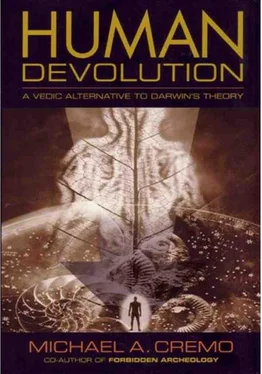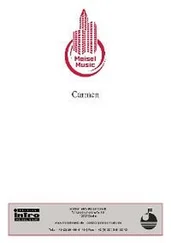Michael Cremo - Human Devolution - A Vedic Alternative To Darwin's Theory
Здесь есть возможность читать онлайн «Michael Cremo - Human Devolution - A Vedic Alternative To Darwin's Theory» весь текст электронной книги совершенно бесплатно (целиком полную версию без сокращений). В некоторых случаях можно слушать аудио, скачать через торрент в формате fb2 и присутствует краткое содержание. Год выпуска: 2003, ISBN: 2003, Издательство: Torchlight Publishing, Жанр: Старинная литература, на английском языке. Описание произведения, (предисловие) а так же отзывы посетителей доступны на портале библиотеки ЛибКат.
- Название:Human Devolution: A Vedic Alternative To Darwin's Theory
- Автор:
- Издательство:Torchlight Publishing
- Жанр:
- Год:2003
- ISBN:9780892133345
- Рейтинг книги:4 / 5. Голосов: 1
-
Избранное:Добавить в избранное
- Отзывы:
-
Ваша оценка:
- 80
- 1
- 2
- 3
- 4
- 5
Human Devolution: A Vedic Alternative To Darwin's Theory: краткое содержание, описание и аннотация
Предлагаем к чтению аннотацию, описание, краткое содержание или предисловие (зависит от того, что написал сам автор книги «Human Devolution: A Vedic Alternative To Darwin's Theory»). Если вы не нашли необходимую информацию о книге — напишите в комментариях, мы постараемся отыскать её.
Human Devolution: A Vedic Alternative To Darwin's Theory — читать онлайн бесплатно полную книгу (весь текст) целиком
Ниже представлен текст книги, разбитый по страницам. Система сохранения места последней прочитанной страницы, позволяет с удобством читать онлайн бесплатно книгу «Human Devolution: A Vedic Alternative To Darwin's Theory», без необходимости каждый раз заново искать на чём Вы остановились. Поставьте закладку, и сможете в любой момент перейти на страницу, на которой закончили чтение.
Интервал:
Закладка:
Upon being interviewed by one of the authors of Phantasms of the living, Mrs. Polson testified that she had not had any hallucinations before or after the apparition of caroline. At the time of her written testimony, given in 1883, Mrs. Polson was residing at 4 nouvelle Route de villefranche, nice, in france. A governess employed by Mrs. Polson at the time of the apparition testified on January 11, 1884: “Many years ago Mr. and Mrs. Polson, with the children and myself, were sitting one evening in the drawing-room at Woolstone. In the middle of the evening Mrs. Polson left the room, but soon returned; remaining silent, I looked up, and saw her drop down on the rug fainting. When she recovered, she told us she had seen Mrs. Gibbs on before her in the long passage. I recollect hearing that the little cornish girl said she had seen that same apparition” (Gurney et al. 1886, v. 1, p. 179).
On the night of August 21, 1869, Mrs. James cox was sitting in her bedroom in her mother’s house at devonport, England. Between the hours of eight and nine o’clock, her nephew, seven years old, came into her room, saying in a frightened voice, “Oh, auntie, I have just seen my father walking around my bed.” Mrs. cox replied, “nonsense, you must have been dreaming.” The boy replied that he had not been dreaming and refused to return to his room. Mrs. cox placed him in her own bed, where he went to sleep while she stayed up. Mrs. cox recalled, “Between 10 and 11, I myself retired to rest. I think about an hour afterwards, on looking towards the fireplace, I distinctly saw, to my astonishment, the form of my brother seated in a chair, and what particularly struck me was the deathly pallor of his face. (My nephew was at this time fast asleep.) I was so frightened, knowing that at this time my brother was in Hong Kong, china, that I put my head under the bed clothes. Soon after this I plainly heard his voice calling me by name; my name was repeated three times. The next time I looked, he was gone.” The next morning Mrs. cox told her mother and sister what had happened, and made some notes of the night’s events. The next mail from china brought news of her brother’s death. He had died August 21, 1869 in Hong Kong. A subsequent official communication from the Admiralty confirmed this. Mrs. cox wrote her report on december 26, 1883, while at Summer Hill, Queenstown, Ireland. On february 21, 1884, Mr. James cox responded to queries by one of the authors of Phantasms of the living, confirming, on his wife’s behalf, the details of the account given above. Mr. cox was Secretary to the naval commander-in-chief at devonport. In another conversation with an author of Phantasms of the living, Mrs. Cox stated that she had never experienced anything similar, before or after the apparition (Gurney et al. 1886, v. 1, pp. 235–236).
Some skeptics attributed such crisis apparitions to chance, inspiring statistical studies which tended to show that crisis apparitions were most likely not simply coincidental. William James, for example, cited studies showing that crisis apparitions occurred in the population at a rate 440 times greater than would be expected by chance (James 1897; in Murphy and Ballou 1960, pp. 35–36). This suggests that the apparitions can be attributed to some power of the mind to receive sensory impressions from distant locations, beyond the scope of ordinary perception.
Aside from researchers working with the SPR, others also documented apparition reports from the same period. The following case of an apparition of a living person is particularly interesting because of its reciprocal nature. In 1863, Mr. S. R. Wilmot was on a ship bound for the United States from Europe. He was sharing a cabin with a friend, W. J. Tait. At night, Wilmot would sleep in the lower berth, and Tait in the upper. The arrangement of the berths was unusual. The upper birth, instead of being located directly above the lower birth, was offset to the rear. One night, Wilmot, while dreaming, saw his wife, dressed in night clothes, enter the room. Wilmot recalled: “At the door she seemed to discover that I was not the only occupant of the room, hesitated a little, then advanced to my side, stooped down and kissed me and after gently caressing me for a few moments, quietly withdrew.” The next morning, Tait chided his friend about having a woman come in to visit him at night. His description of what he saw, while awake, matched Wilmot’s dream. When Wilmot returned home, his wife asked if he had received a visit from her the previous Tuesday. Wilmot observed such a visit would have been impossible because he had been at sea. His wife replied, “I know it, but it seemed to me that I visited you.” She told her husband she had been worried about him, and had felt herself mentally going across the sea until she found the ship. She had then entered his stateroom, and noticed the unusual arrangement of the berths, with one extending back further than the other. She recalled, “A man was in the upper berth looking right at me, and for a moment I was afraid to go in, but soon I went up to the side of your berth, bent down, and kissed you and embraced you and then went away” (Griffin 1997, pp. 225–226).
About these apparition appearances, philosopher david Ray Griffin (1997, p. 211) noted, “Most people reporting them never experience another apparition in their lives; apparitions are not correlated with illness or morbidity on the part of the percipients; and telepathic apparitions are usually visual in nature (in distinction from hallucinations of the insane, which are primarily auditory).”
Sir William Crookes (Physicist)
The observations of Sir William crookes, a nobel laureate in physics and a president of the Royal Society, are among the most remarkable in the modern history of psychical research. Some of his observations, made along with Sir Alfred Russel Wallace, have already been noted in chapter 5. crookes performed many experiments involving the medium daniel dunglass Home, who was never detected in fraud.
for one set of experiments with Home, crookes set up a “balance apparatus.” It consisted of a mahogany board (36 inches long by 91/2 inches wide by 1 inch thick) with a small portion of one end resting on the edge of a table. The rest of the board extended horizontally from the edge of the table, being supported at its other end by a spring balance, which at the board’s horizontal position gave a reading of three pounds. Home, sitting in a low chair, lightly placed the tips of his fingers on the end of the board resting on the table, no more than 11/2 inches from the end of the board. crookes noted that the other end of the board began to move slowly down and then back up, causing the pointer of the balance to move, and register changes in weight. To insure that Home was not applying any great pressure, crookes arranged for him to put his fingers on a matchbox placed on the end of the board resting on the table. If Home did apply pressure, the box would be crushed (the box remained intact). during these tests, the balance showed additional weight of from 31/2 to 6 pounds. Once crookes stepped on the end of the board on the table, pressing with the entire force of his whole body, and produced only 11/2 to 2 pounds of additional pressure. Also participating in this experiment was William Huggins, a prominent physicist and astronomer, and like crookes, a fellow of the Royal Society (crookes
1871a; in Medhurst and Goldney 1972, pp. 28–29). crookes then made another arrangement by which no direct muscular pressure at all was applied to the board. The medium’s fingers rested in a water container placed on a separate stand just barely in contact with the board. The same results were obtained.
crookes forwarded an account of the experiments to the Royal Society on June 15, 1871 and requested the secretaries of the Society, Professor Sharpey and Professor Stokes, to come and observe the experiments for themselves. Sharpey refused. Stokes said he would come to look at the apparatus but would not agree to meet the medium or witness experiments. crookes replied on June 20, again inviting Stokes to witness an actual experiment. crookes promised that the experiment would be carried out under the most careful scrutiny and that the results, positive or negative, would be published.
Читать дальшеИнтервал:
Закладка:
Похожие книги на «Human Devolution: A Vedic Alternative To Darwin's Theory»
Представляем Вашему вниманию похожие книги на «Human Devolution: A Vedic Alternative To Darwin's Theory» списком для выбора. Мы отобрали схожую по названию и смыслу литературу в надежде предоставить читателям больше вариантов отыскать новые, интересные, ещё непрочитанные произведения.
Обсуждение, отзывы о книге «Human Devolution: A Vedic Alternative To Darwin's Theory» и просто собственные мнения читателей. Оставьте ваши комментарии, напишите, что Вы думаете о произведении, его смысле или главных героях. Укажите что конкретно понравилось, а что нет, и почему Вы так считаете.












